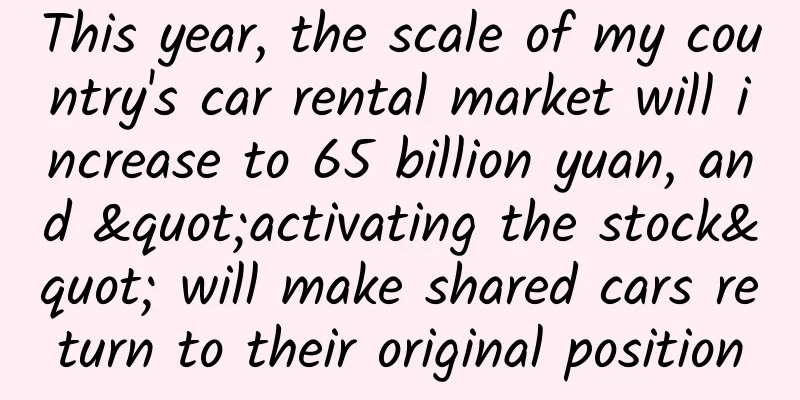This year, the scale of my country's car rental market will increase to 65 billion yuan, and "activating the stock" will make shared cars return to their original position

|
Scan the QR code with your mobile phone to drive and travel. The road is as long as your heart goes. With the improvement of intelligent technology and business model, shared cars, which can solve travel problems to a certain extent, have gradually become popular. Data shows that the car-sharing market will grow by more than 50% in the next five years. Shared cars, which have been "born" for some time, will now pay more attention to innovation, focus on revitalizing existing stocks, and aim at consumption upgrades. Car sharing is not a new thing, and people are familiar with it. Car sharing began to appear a few years ago, but in the "first half" of car sharing, the industry has been in a tepid state. This is firstly because car sharing is an asset-heavy operation model with high risks, which restricts the development of the car sharing market; in addition, such problems as parking spaces in many cities are tight, license plates need to be drawn by lottery, etc., are all realistic problems facing the development of car sharing. In the "first half", car sharing is almost "bound" with new energy vehicles, which also restricts the development of car sharing to a certain extent. Today, car-sharing has become more innovative. With the expansion of the market and the upgrading of demand, a sharing model dedicated to revitalizing existing license plates and improving the efficiency of traditional fuel vehicles is emerging. Roland Berger, a consulting firm, predicts that the scale of my country's car rental market will increase to 65 billion yuan this year, and there is great potential for new sharing models to revitalize existing stocks. Other data show that the average idle time of private cars in my country has exceeded 20 hours per day. Activating the "silent costs" of more vehicles and revitalizing idle vehicle resources. For car owners, sharing vehicles with others can save parking fees, and they can also get rewards for themselves through sharing, helping and facilitating others. For society, by revitalizing idle vehicle resources, it can maximize the use and conservation of social resources, and it is also conducive to reducing the "rigid need" to buy cars, thereby alleviating urban congestion. This is "subtracting" urban congestion, which in turn can bring benefits and convenience to citizens. The shared ride-sharing model that shared cars now follow is somewhat similar to the private carpooling model commonly known as carpooling and hitchhiking. This is more in line with the essence of the sharing economy, making the shared car industry more like a pure sharing model, and is more conducive to shared cars solving the social problems of difficulty in using cars and traveling, and can also allow shared cars to go further and better. In addition, the increasing popularity of shared cars has also made competition more intense, which has led more and more platforms to work hard to improve the experience, such as optimizing and innovating services, such as innovating insurance services, making travel more secure, and striving to do a better job in travel experience, etc. These are also conducive to the shared car industry entering a healthy competition of survival of the fittest. As car-sharing enters the "second half" of the booming industry, there is reason to believe that car-sharing can do better in terms of facilitating life and solving social problems. Of course, for car-sharing, the government also needs to strengthen guidance and regulation, establish and improve the corresponding regulatory mechanism, and improve relevant policies. New business forms such as car-sharing cannot be too strictly controlled, but they cannot be left to their own devices either. For example, there are potential safety hazards in car-sharing, and how to distinguish responsibilities when users drive vehicles and get into traffic accidents or even involve life, etc. These all need to be solved urgently so that car-sharing can move forward quickly and develop healthily on the right track. As a winner of Toutiao's Qingyun Plan and Baijiahao's Bai+ Plan, the 2019 Baidu Digital Author of the Year, the Baijiahao's Most Popular Author in the Technology Field, the 2019 Sogou Technology and Culture Author, and the 2021 Baijiahao Quarterly Influential Creator, he has won many awards, including the 2013 Sohu Best Industry Media Person, the 2015 China New Media Entrepreneurship Competition Beijing Third Place, the 2015 Guangmang Experience Award, the 2015 China New Media Entrepreneurship Competition Finals Third Place, and the 2018 Baidu Dynamic Annual Powerful Celebrity. |
Recommend
iPhone 6S battery has shrunk! What about battery life?
At the press conference, Apple did not announce t...
Why do most people prefer meat to vegetables?
Many people feel that a dish without meat has no ...
Those cool little-known facts about WeChat operations, how to promote and operate WeChat
How did you create the above cool and somewhat al...
As the college entrance examination approaches, a big competition of brain-boosting foods! Walnuts are at the bottom of the list? You would never have thought that the first one would be
The college entrance examination is coming soon, ...
How can a newbie make money with Huajiao Live? How much can a newbie make in a day with Huajiao Live?
Five years ago, if you said that live streaming c...
Summer heat is coming! Dig up the ancients' secret recipes for keeping cool
In the hot summer, air conditioners, watermelons,...
Does the panda blood in "The Storm" indicate that there is a "big human secret" hidden in the play?
In literary and artistic works, panda blood is a ...
WeChat applet development video tutorial compilation [Baidu cloud resource collection]
On January 9, 2017, the mini program released by ...
User Growth Tips
The background for writing this article is due to...
Has the new media dividend passed? You don’t know how to spread content!
We often say that the bonus period of WeChat new ...
Sony SP700N noise-cancelling sports beans review: No one around except the natural sound
Sony's efforts in noise-canceling earbuds are...
Practical guide to Tencent advertising marketing!
Advantages of Tencent Trading Site 1. Expanding e...
Good news for people with allergies. Will the new coronavirus avoid you?
[This issue's rumor]: Recently, there are rum...
Gou Wenqiang's "31 Posture Correction Training Camp" will give you a perfect body
Introduction to the training course content: In 7 ...
Five common communication methods between iOS apps
The iOS system is a relatively closed system. Eac...









